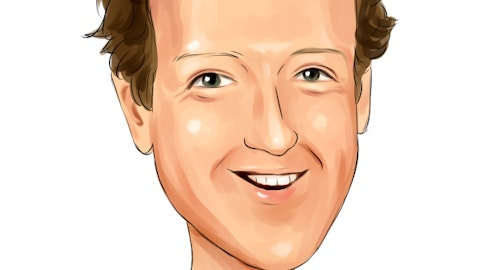When Mark Zuckerberg built “The Facebook Inc (NASDAQ:FB)” back in 2004, his goal was to “create a richer, faster way for people share information about what was going on around them.” Now, with over a billion people sharing their information freely, Zuck has a few new goals, which he revealed in the company’s most recent conference call: “connect everyone, understand the world, and help build the knowledge economy.”

These are long-term goals, as Zuckerberg put it; these are the changes he wants to make in the world over the next 5 to12 years. This long-term outlook, which Zuckerberg and Facebook Inc (NASDAQ:FB) have seemingly always held, is what makes Facebook Inc (NASDAQ:FB) the kind of company worth a Foolish investment.
Connect everyone
There are currently only about 2.7 billion people with Internet access around the world. Even in the U.S., only about 80% of the population has access to the Internet. That leaves a huge 4 billion person market for a company like Facebook Inc (NASDAQ:FB) to monetize.
In the last two years Facebook Inc (NASDAQ:FB) has made it easier and less expensive to access its service, particularly in developing countries. It launched its “Facebook Inc (NASDAQ:FB) for every phone,” which recently reported its 100 millionth user and contributed to significant earnings growth in Asia and the rest of the developing world. Additionally, Facebook is making deals with carriers to allow subscribers to use Facebook’s app and website without paying for data.
Internet growth is decelerating, and companies like Facebook and Google Inc (NASDAQ:GOOG) are working to ramp up the growth again. Google Inc (NASDAQ:GOOG), for its part, is full of interesting experiments to help increase access to the Internet and its services. For example, a network of blimps or balloons carrying wireless signals across Sub-Saharan Africa and Southeast Asia could connect approximately 1 billion people.
It’s no doubt that both Facebook and Google Inc (NASDAQ:GOOG) have a lot to gain from increased connectivity. The two advertising giants rely on scale to grow ad revenue. And while the next 5 billion Internet users will mostly come from the developing world, where ad rates are lower for both companies, it’s reasonable to expect rates to climb as those economies grow. In the meantime, scale will have to make up for lower rates. So, both in the near-term and long-term, there’s lots of growth left for these Internet advertisers in connecting the rest of the world.
Understand the world
With its 1 billion-plus active users, Facebook is gathering new information every second that can help it build up long-term knowledge about the world: people’s interests, favorite restaurants, good hotels. Unlike networks like Yelp Inc (NYSE:YELP), which specifically ask for user generated reviews, Facebook is gathering this information organically.
As this knowledge base grows, Facebook will become a bigger threat to networks like Yelp Inc (NYSE:YELP) and TripAdvisor as it develops new services that help users find the information they want. Graph Search was the first of such services, but is really only a starting point for Facebook. Zuckerberg believes his company “should be able to build intelligent services … that could answer lots of questions for you that no other service can.”
Last year, Yelp Inc (NYSE:YELP) generated $138 million off of its 86 million unique visitors (twelve month average)That number is expected to grow with the website’s audience, but the company’s margins will continue to feel pressure as new competition from both Facebook and Google encroach on its local business review market. As Yelp is just an advertising business, attracting a large audience is key. Both Facebook and Google have significantly larger audiences and the capabilities to make competitive products. I expect Facebook to move swiftly into this area, which should attract more advertisers and ad views.




